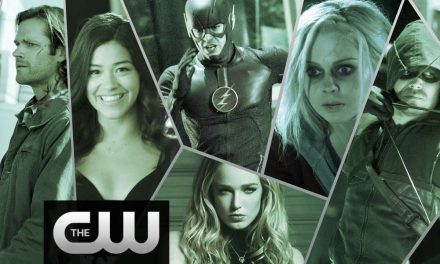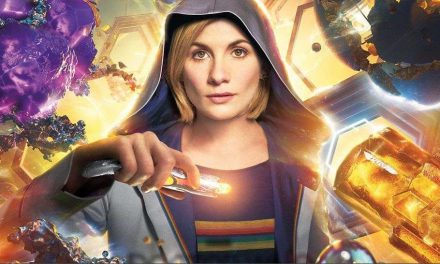At some point during the first episode of Judd Apatow’s new Netflix series Love – co-written and co-produced with Paul Rust and Lesley Arfin – the show lost me: or rather, to be more precise, it irritatedme, because in fact, it didn’t lose me at all. As the episode came to a close, and flung out its binge-watching hook to lure me into watching the next one, I found myself immediately clicking on the ‘play next episode’ button before the credits had even finished. And this, despite the fact that I found its depiction of the heterosexual romance between Mickey, played by Gillian Jacobs, and Gus, played by Paul Rust, to be objectionable.
This pattern of my feeling annoyed and incredulous – and yet instantly hitting the ‘play next episode’ button – continued (over a three day period) to the final, 10th episode of the programme, ‘The End of the Beginning.’ If anything, my active dislike of the show’s sexual and gender politics heightened my awareness of its binge-watching qualities as I began to think about what compelled me to keep watching. This blog, then, is offered as a reflection on the politics of binge-watching in the context of televisual un-pleasure: it’s about not feeling the love, and about how the tired sexism of the narrative trajectory of Love relates to its structured mode of address to a Netflix audience.
Let me begin with ‘It Begins’, the first episode, where we are introduced to the principal characters, Mickey and Gus, who don’t actually meet each other until the end of the episode. Geeky Gus is in bed with his girlfriend in a banal, if apparently loving set-up, where we watch them home shop on their laptops and then have perfunctory sex. Cross cut to a scene where beautiful Mickey, is asleep in her house when a balding, poorly dressed, and obnoxious man bursts into her bedroom unannounced, high on cocaine, looking for sex. She agrees to it as long as he doesn’t stay overnight; a shot or so later we see him taking her energetically from behind shouting out: ‘I am God’s warrior’ as she pants ‘Yes you are! Yes you are!’ This opening sets the tone for a series of awkward pairings in which the terms of the heterosexual ‘love’ on display is negotiated at the expense of the woman.
The narrative arc of Love follows a very standard rom-com formula, from the first meeting between Gus and Mickey, to their heterosexual coupling and short-lived romance, to their falling out and eventual reconciliation. At the end of the first episode, Mickey and Gus have their ‘meet cute’ at a gas station confectionary, when Gus loans Mickey money to buy a cup of coffee after he witnesses her have a meltdown. It is an obvious hook for what James Poniewozik has recently called ‘The Suck’ of binge-watching, the ‘user-directed’ pull of a show, where like, a video game, ‘each episode becomes a level to unlock’. Here the dynamics of the rom-com genre are laid bare: the odd couple has met, now what will happen next?
Click ‘play next episode’ where we find Mickey continuing to wear the skimpy red bathing suit she wore in episode one as she draws the seemingly innocent, nerdy Gus into her wild, drug-fuelled world. Initially he seems to like her more than she does him, which would be in keeping with the visual mismatch between the two. However, as the series goes on, Mickey is shown to be the one who is more besotted. Indeed, the show is largely about deconstructing Mickey from an apparently strong if wild and unconventional woman who denounces ‘those dipshits she went to school with’ for posting trite pics of their kids on Facebook, to a weeping, blubbering emotional mess who ends up stalking Gus at work. By contrast, the ‘newly confident’ Gus as he is described in the blurb for episode 6, goes from strength to strength both professionally (his script is finally commissioned) and personally, as gorgeous woman after gorgeous woman, wants to have sex with him.
In a recent piece for Vulture, Pilot Viruet has identified this trope of the “ugly guy” getting the “hot woman” as having a long history in television, from The Honeymooners through to Everybody Loves Raymond and The Big Bang Theory Although Viruet refers only to the central pairing between Mickey and Gus when discussing its ‘attractiveness gap’, this trope is repeated with such frequency and in so many different ways across the entire series of Love, that it warrants further commentary.
For example: in episode one, Gus is at a party with a group of younger twenty somethings when two pretty girls invite themselves back to his apartment, and proposition him for a threesome. Gus is nervous at first but agrees, and the three begin to fool around only for Gus to stop the proceedings when he discovers that the two girls are sisters. Disgusted and morally outraged, Gus declares that this is something close to incest, to which one of the girls responds: ‘hey, relax, what’s your problem? You know for most guys this would be like a fantasy.’ What’s irksome is how Love is both able to express this clichéd patriarchal fantasy of sex with gorgeous sisters – indeed, it is notable that Gus’ moral outburst comes only after the girls expose their breasts for viewers – and disavow it in a way that protects an idea of the male as morally superior and denigrates the female as shallow and promiscuous.
And so it goes: over and over again, in various formulations, so much so that, whether one is psychoanalytically inclined or not, it becomes impossible to overlook: a geeky not too handsome white man is shagging an unbelievably good looking white woman is the fantasy mise-en-scene of Love.
In episode 5, we are introduced to Elise, a buxom blonde Canadian actress on the set of Wichita, the fictional show where Gus works as tutor to the young stars. Elise inexplicably fancies Gus and determinedly pursues him until finally, in episode 6, she has her way with him and is pictured enthusiastically astride him, as she makes references to the witch TV show she stars in – ‘I’m going to put a spell on your dick!’ This scene is cross cut with shots of a forlorn, heartbroken Mickey trawling through images on Gus’ Facebook page. Click ‘play next episode’ and episode 7 begins with Mickey watching a video clip online of Gus delivering a best man speech about ‘true love’ at his friend’s wedding, as she descends further into her self-destructive spiral. Later in episode 9, scenes of an increasingly desperate Mickey going to Gus’ workplace to track him down, are cross cut with scenes of Gus getting a blow job from Elise in the middle of an empty warehouse on set.
Near the end of the series, the show appears to make at least some sort of acknowledgement of the problematic fantasy it is touting when Gus tells the 12 year old girl he tutors (who is played by Judd Apatow’s daughter Iris), that he won’t be able to be her friend outside of work: ‘A grown adult man doesn’t…go out hanging with a young pre-pubescent girl okay, I’m not Woody Allen all right? I don’t hang out with people who are 1/16th my age!’ Here, the show makes self-reflexive reference to the obvious point of physical comparison between comedians Paul Rust and Woody Allen and their on screen pairing with beautiful actresses, but then backs away from it by making it all about the issue of ‘age’. In other words, it does not explore the other power differentials at stake that make it acceptable – indeed commonplace – for a man, however conventionally attractive or unattractive he may be, to call the shots when its comes to the power plays of sex and relationships.
Caroline Framke has suggested that the Netflix platform of 10 episodes meant that Love had a lot of time to fill and was therefore not edited as tightly as it might have been. Variety’s Brian Lowry appear to agree with this point, albeit less critically, when he makes note of Love’s ‘slow-motion deconstruction of how a relationship can evolve’. And yet, for me, what is most interesting about the viewing dynamics of Netflix is how its viewer-led pacing challenges any easy opposition between slow and fast. As I binge-watch Love, I actively intervene to speed up the pace of what I am watching in ways that help me to observe the mechanics of its problematic gender politics.
When Framke argues that Episode 5, ‘The Date’, is when Love ‘clicks into gear’, and really picks up its stride, I agree, but for slightly different reasons. Episode 5, ‘The Date’, is a crucial turning point in the series because it is the episode where Love openly exposes ‘the gears at work’ (Mittell 2015: 43) in its rendering of Mickey’s character. The episode begins with Mickey smoking weed before attending an AA meeting, where we learn that she is a sex, drug and alcohol addict. This revelation has the effect of making us (mentally but also perhaps literally) play back episodes we have watched previously and rethink the nature of her ‘wild’ behavior, which is now recast in terms of pathology and addiction. It is as if we are supposed to say, oh, Mickey is actually deeply damaged underneath all that bravado, I get it now. Significantly, Gus does not find this out until the last episode, which is a repeat of their meet cute at the gas station. In this final scene, Mickey confesses her addiction problems to Gus and apologizes to him for being difficult, at which point he kisses her passionately. Click ‘play next episode’: oh wait, game over. At least, that is, until the already commissioned second series begins.
Tanya Horeck is a Reader in Film, Media & Culture at Anglia Ruskin University. She is author of the book Public Rape: Representing Violation in Fiction and Film (Routledge 2004) and the co-editor of two anthologies, The New Extremism in Cinema: From France to Europe (University of Edinburgh Press 2011) and Rape in Stieg Larsson’s Millennium Trilogy and Beyond (Palgrave MacMillan 2013). Currently, she is working on a book, Capturing Crime in the Digital Age (forthcoming from Wayne State University Press).




